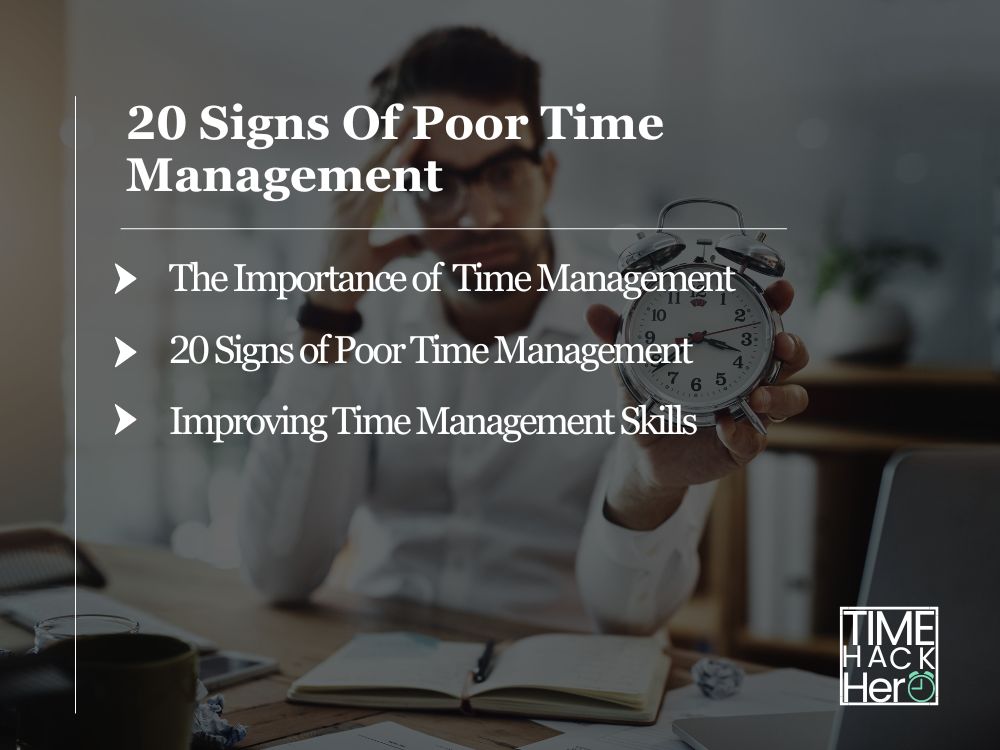Time management is a crucial skill for both our personal and professional lives. With the fast-paced nature of modern life, effectively managing our schedules and to-do lists helps us maintain balance, reduce stress, and accomplish our goals more efficiently. However, it can be difficult to recognize when our time management skills might be faltering. In this article, we will identify some common signs of poor time management.
One indicator of poor time management is a pattern of missed deadlines or constantly feeling overwhelmed by tasks. This can be accompanied by impatience, frustration, and chronic procrastination. Another sign is a lack of clearly defined goals, which can lead some individuals to struggle with prioritizing important tasks or distinguishing important tasks from distractions. Additionally, common time management mistakes include not having a plan, being bad at estimating time, and allowing distractions to interfere with work.
By identifying these signs in our own daily routines, we can take crucial steps towards improving our time management skills. This will inevitably lead to increased productivity, reduced stress levels, and a greater sense of control over our personal and professional lives.
Table of Contents
The Importance of Time Management
Productivity and Performance
Good time management skills are crucial for productivity and performance. By prioritizing tasks and setting deadlines, individuals can ensure that they allocate the right amount of time to important tasks. This helps to avoid procrastination and ensures that deadlines are respected. Utilizing a calendar is an effective way to keep track of tasks and helps in staying on track with productivity goals.
Stress and Anxiety
Poor time management can lead to stress and anxiety, as individuals struggle to meet deadlines and complete tasks on time. By learning how to manage time effectively, individuals can reduce stress levels and feel more in control of their day-to-day life. This not only improves mental health but also makes one feel more motivated and in control of their responsibilities.
Work-Life Balance
Maintaining a healthy work-life balance is essential for overall well-being. When individuals have a good grasp of time management, they can prioritize their responsibilities in both their professional and personal lives. This ensures that they can dedicate adequate time to both aspects of their life, reducing the feeling of being overwhelmed and promoting a better work-life balance.
Career Growth
Effective time management is a valuable skill in any career, as it enables individuals to handle their workload efficiently and meet deadlines consistently. By developing strong time management skills, employees can demonstrate their dedication and competence to employers, which can lead to improved job performance and potential career advancement opportunities.
20 Signs of Poor Time Management
Missing Deadlines and Poor Punctuality
Missing deadlines is a clear sign of poor time management. This can lead to frustration, anxiety, and even damage to professional relationships. Poor punctuality, such as consistently arriving late to meetings, can also indicate a lack of effective time management skills.
Always Rushing and Multitasking
Those with poor time management tend to constantly rush through tasks and attempt to multitask. This can lead to errors, decreased performance, and increased stress levels. Multitasking often results in a lack of focus and concentration on specific tasks.
Procrastination and Distractions
Procrastination is a major sign of poor time management, characterized by putting off tasks in favor of less important or more enjoyable activities. Distractions, such as email, social media, and interruptions from colleagues, can further compromise time management skills.
Ineffective Prioritization and Scheduling
Inability to prioritize tasks and schedule them effectively contributes to poor time management. This often involves focusing on less important tasks while neglecting the more urgent and time-sensitive ones. Effective time management includes using tools like the Eisenhower Matrix and time blocking to organize tasks.
Poor Communication and Lack of Focus
Poor communication can lead to mismanagement of time, as it creates confusion and misunderstanding regarding tasks and responsibilities. A lack of focus exacerbates this issue, preventing efficient completion of tasks and adherence to deadlines.
Constantly Working Overtime and Skipping Breaks
Consistently working overtime and skipping breaks are signs of poor time management. Overworking can lead to burnout, decreased energy, and reduced overall productivity. Taking regular breaks and managing workload effectively are essential for maintaining focus and energy levels.
Low Energy and Burnout
Poor time management often results in low energy levels and eventual burnout. This is due to excessive workload, lack of rest, and failure to manage time effectively. Burnout can have a detrimental impact on personal and professional life, making it crucial to recognize and address the signs of poor time management.
Improving Time Management Skills
Setting Clear Goals and Priorities
To improve time management skills, start by setting clear goals and priorities. Break down your goals into smaller, achievable tasks and rank them according to their importance. This prioritization ensures you focus on higher-priority tasks first and avoid becoming victims of distractions or procrastination.
Creating a Balanced Schedule
A balanced schedule is essential for effective time management. Allocate time for work, personal, and leisure activities to maintain a healthy work-life balance. Use time-management tools like Google Calendar to plan out your days and weeks. Regularly update and revise the schedule to accommodate changes and urgencies.
Using Time-Management Tools and Techniques
There are various tools and techniques available to aid in time management. For creating to-do lists, consider using tools like Apple Notes or Memo Cube. Time tracking apps, such as Toggl or TimeDoctor, can help monitor how you spend your time. To reduce distractions, using apps like Freedom can be beneficial in blocking websites or applications during work hours.
| Tool | Purpose |
|---|---|
| Google Calendar | Scheduling |
| Apple Notes | To-Do Lists |
| Memo Cube | To-Do Lists |
| Toggl | Time Tracking |
| TimeDoctor | Time Tracking |
| Freedom | Blocking Distractions |
Delegating Work and Collaborating
Delegating tasks to others can significantly improve time management. Entrust tasks to colleagues or team members who have the necessary skills and expertise. By delegating, you can focus on work quality and high-priority tasks while ensuring an efficient distribution of tasks among team members.
Regularly Reviewing Progress and Adapting
Regularly reviewing your progress in terms of time management is crucial for continuous improvement. Analyze your successes and setbacks in managing time and adapt your strategies accordingly. Periodic checks help identify areas for improvement and allow for necessary adjustments in goal-setting or schedule planning.









